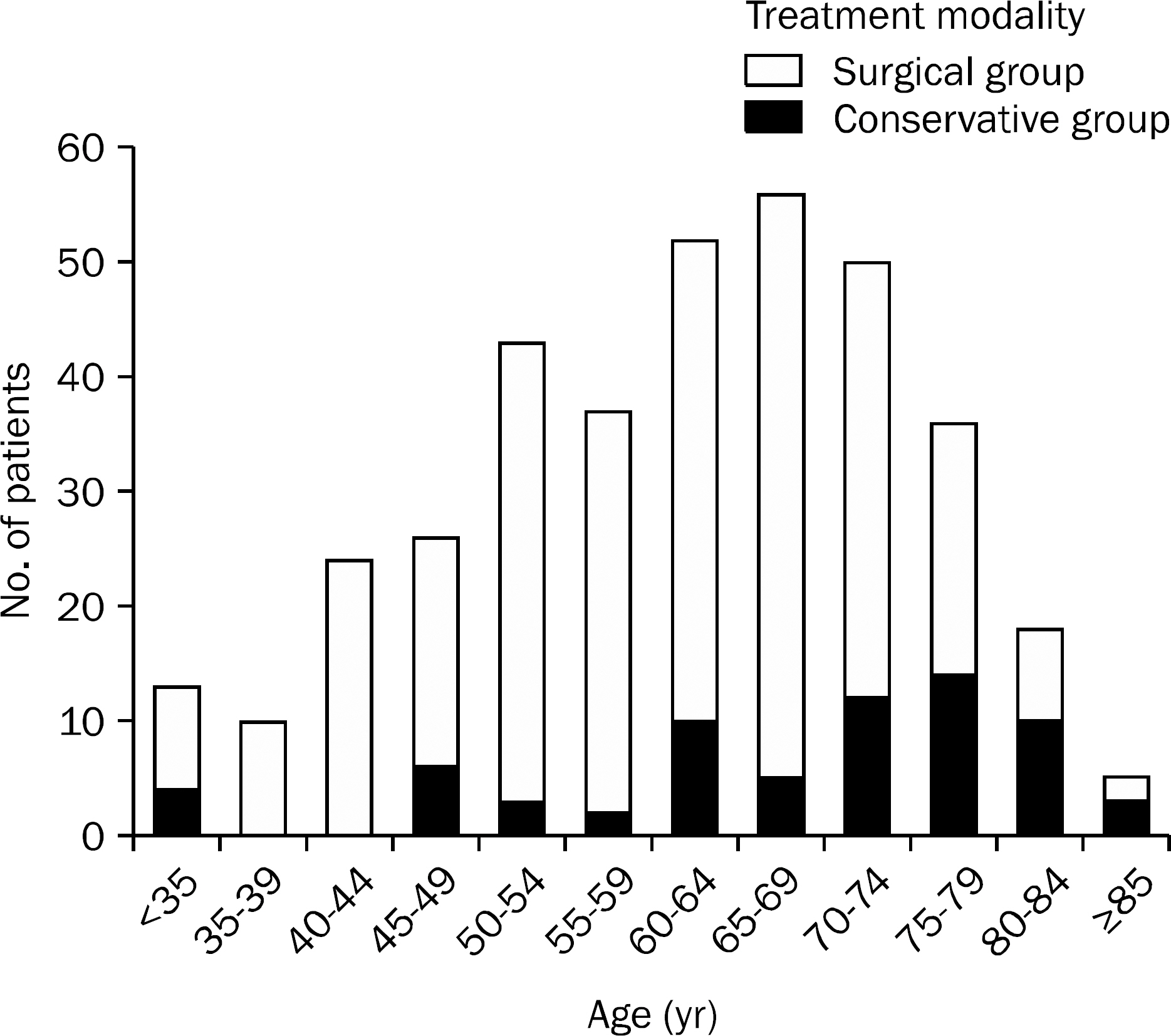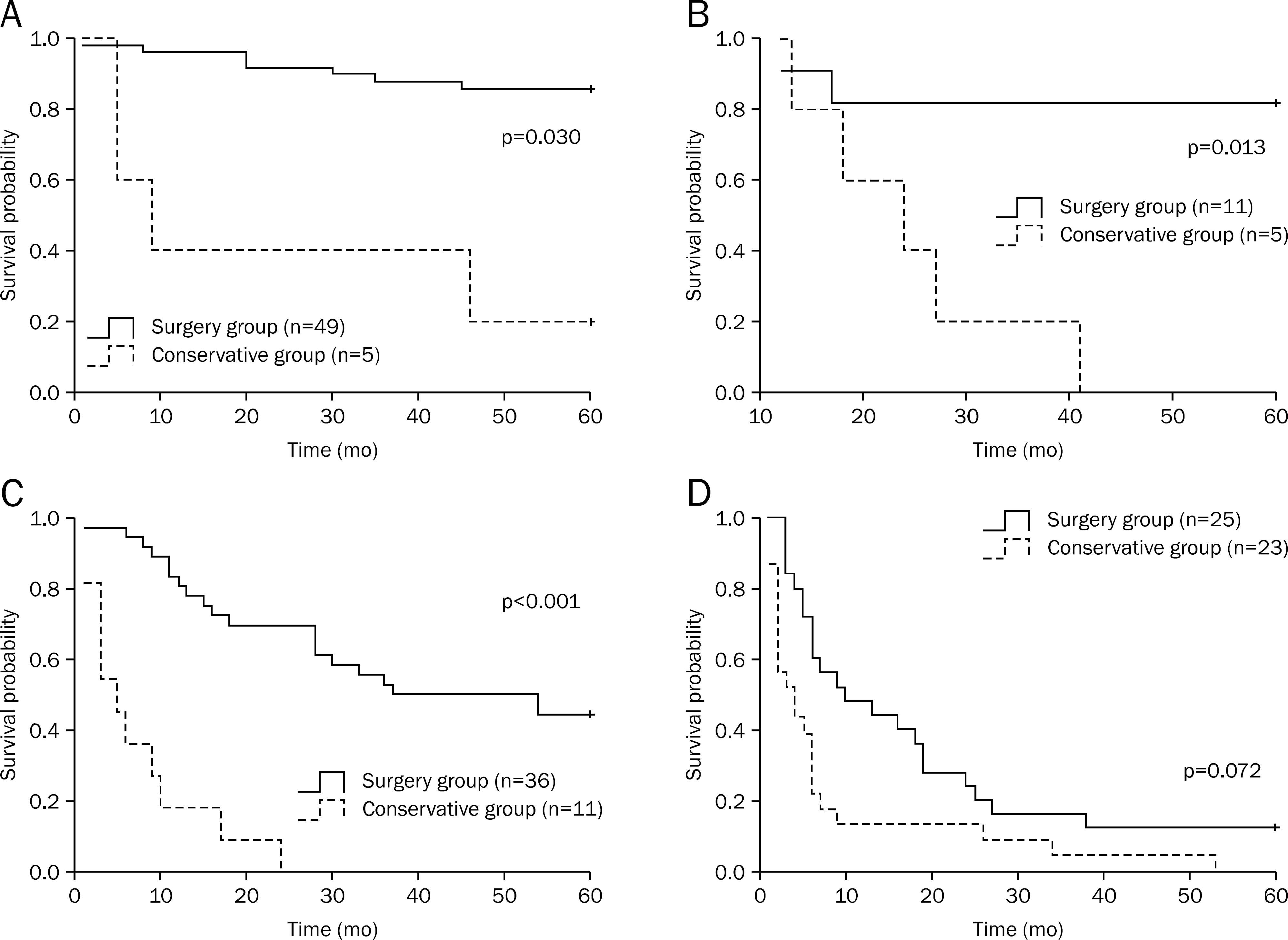Korean J Gastroenterol.
2011 Jul;58(1):9-19. 10.4166/kjg.2011.58.1.9.
Clinicopathological Characteristics of Gastric Cancer and Survival Improvement by Surgical Treatment in the Elderly
- Affiliations
-
- 1Department of Internal Medicine, Ewha Medical Research Institute, Ewha Womans University School of Medicine, Seoul, Korea. shimkn@ewha.ac.kr
- KMID: 1792809
- DOI: http://doi.org/10.4166/kjg.2011.58.1.9
Abstract
- BACKGROUND/AIMS
It has been known that elderly patients with gastric cancer show worse general condition and higher comorbidities. Therefore, few elderly patients undergo surgery. This study was designed to determine clinicopathological characteristics of gastric cancer in elderly patients and evaluate their survival improvements by the surgical treatment.
METHODS
Gastric cancer patients, diagnosed at Ewha Womans University Mokdong Hospital between 2000 to 2004, were divided into two groups those aged > or =65 years vs. <65 years. Clinicopathological characteristics, incidence of postoperative complications, and survival time of patients in each group were analyzed.
RESULTS
Total 370 patients were subjected and divided into the elderly and the younger group (55.4% vs. 44.6%). The elderly group showed higher incidences of hypertension and cardiovascular disease. Well differentiated adenocarcinoma was more frequently found in the elderly group (19.0% vs. 10.0%, p=0.025). There were no differences of operation time (242.6+/-70.7 vs. 257.3+/-83.8 min, p=0.115), postoperative hospital stays (15.8+/-10.6 vs. 14.7+/-9.8 days, p=0.361), and incidence of any complications (6.7% vs. 9.9%, p=0.309) between the two subgroups. The significant factors related with the elderly patient's survival were the tumor-node-metastasis (TNM) stage (stage I, hazard ratio [HR] 1.00; stage II, HR 1.28, 95% confidence interval [CI] 0.44-3.72; stage III, HR 4.06, 95% CI 2.08-7.92, stage IV, HR 9.78, 95% CI 4.97-19.26;p<0.001) and the treatment modality (laparoscopy, HR 1.00; open surgery, HR 3.90, 95% CI 2.43-6.26;p<0.001). The elderly patients who underwent gastric cancer surgery showed prolonged survival on TNM stage I, II, and III than those who were treated conservatively.
CONCLUSIONS
In the elderly patients with gastric cancer, those who had received surgical treatments showed significantly higher survival rate than those who had treated conservatively. Therefore, aggressive surgical treatments should be seriously considered even for the elderly patients with gastric cancer.
Keyword
MeSH Terms
-
Adenocarcinoma/mortality/*pathology/surgery
Adult
Aged, 80 and over
*Aging
Carcinoembryonic Antigen/analysis
Cardiovascular Diseases/complications/epidemiology
Female
Humans
Hypertension/complications/epidemiology
Kaplan-Meier Estimate
Length of Stay
Male
Middle Aged
Neoplasm Metastasis
Neoplasm Staging
Retrospective Studies
Stomach Neoplasms/mortality/*pathology/surgery
Figure
Cited by 2 articles
-
Factors Influencing on Resilience of Elderly Gastric Cancer Patients
Mi-Seon Bang, Ji-Hyun Lee
Asian Oncol Nurs. 2017;17(3):170-179. doi: 10.5388/aon.2017.17.3.170.Adjuvant Chemotherapy for Advanced Gastric Cancer in Elderly and Non-elderly Patients: Meta-Analysis of Randomized Controlled Trials
Seong-Hwan Chang, Soo-Nyung Kim, Hye Jung Choi, Misuk Park, Rock Bum Kim, Se-Il Go, Won Sup Lee
Cancer Res Treat. 2017;49(1):263-273. doi: 10.4143/crt.2016.054.
Reference
-
References
1. Statistics Korea. Annual report on the cause of death statistics. Daejeon: Statistics Korea;2009.2. Parkin DM, Pisani P, Ferlay J. Estimates of the worldwide incidence of 25 major cancers in 1990. Int J Cancer. 1999; 80:827–841.3. Right information about cancer/Right understanding cancer. [Internet]. Right information about cancer/Right understanding cancer;2010. [cited 2010 Oct 10]. Available from:. http://www.cancer.go.kr/cms/statics/incidence/index.html.4. Newcomb PA, Carbone PP. Cancer treatment and age: patient perspectives. J Natl Cancer Inst. 1993; 85:1580–1584.
Article5. Samet J, Hunt WC, Key C, Humble CG, Goodwin JS. Choice of cancer therapy varies with age of patient. JAMA. 1986; 255:3385–3390.
Article6. Carvalho R, Milne AN, van Rees BP, et al. Early-onset gastric carcinomas display molecular characteristics distinct from gastric carcinomas occurring at a later age. J Pathol. 2004; 204:75–83.
Article7. Yokota T, Kunii Y, Saito T, et al. Prognostic factors for gastric cancer in the elderly. Eur J Surg Oncol. 2001; 27:451–453.
Article8. Miyamoto S, Oota T, Oohashi I, et al. Problems in surgical treatment of carcinoma of the stomach in geriatric patients. J Jpn Surg Soc. 1982; 83:1090–1096.9. Japanese Gastric Cancer Association. Japanese classification of gastric carcinoma-2nd English edition-. Gastric Cancer. 1998; 1:10–24.10. ASA physical status classification system. [Internet]. ASA physical status classification system;1995. [updated 2010 Jun 8; cited 2010 Oct 10]. Available from:. http://www.asahq.org/clinical/physicalstatus.html.11. Sobin LH. TNM classification of malignant tumours. 6th ed.New York: Wiley-Blackwell;2002.12. Hamilton SR, Aaltonen LA. World Health Organization classification of tumours: Pathology and genetics of tumours of the digestive system. Lyon: IARC Press;2000.13. Brown MR, Bhattacharyya N, McPheeters GO, McNamara JJ. Surgical resection of gastric cancer in the octogenarian population. J Gastrointest Surg. 1999; 3:561–564.
Article14. Winslet MC, Mohsen YM, Powell J, Allum WH, Fielding JW. The influence of age on the surgical management of carcinoma of the stomach. Eur J Surg Oncol. 1996; 22:220–224.15. Yancik R, Havlik RJ, Wesley MN, et al. Cancer and comorbidity in older patients: a descriptive profile. Ann Epidemiol. 1996; 6:399–412.
Article16. Kim YJ, Lee CH, Paik WH, et al. Clinical and pathologic characteristics of gastric cancer in elderly Korean patients in Korea. Korean J Med. 2007; 72:256–265.17. Feldman M, Friedman LS, Sleisenger MH. Sleisenger & Fordt-ran's gastrointestinal and liver disease: pathophysiology, diagnosis, management. 7th ed.Philadelphia: Saunders;2002.18. Kwon SJ, Choi DH, Park YS, et al. Comparative studies on clinicopathologic charicteristics and surgical results in senile and young patients with gastric cancer. J Korean Surg Soc. 1997; 52:535–542.19. Kang WS, Cheong O, Jeong MR, et al. Evaluation of the safety and feasibility of D2 lymphadenectomy in elderly patients with gastric cancer. J Korean Gastric Cancer Assoc. 2008; 8:85–90.
Article20. Kim HG, Lee CH, Choi KH, Lee SD, Seo JK. Clinical analysis of surgery in the elderly. J Korean Surg Soc. 1990; 39:792–799.21. Gosain A, DiPietro LA. Aging and wound healing. World J Surg. 2004; 28:321–326.
Article22. Kubota H, Kotoh T, Dhar DK, et al. Gastric resection in the aged (> or = 80 years) with gastric carcinoma: a multivariate analysis of prognostic factors. Aust N Z J Surg. 2000; 70:254–257.23. Jentschura D, Winkler M, Tsuji Y, Hagmüller E. Results of surgical therapy of stomach carcinoma in the elderly. Chirurg. 1997; 68:503–508.24. Monson K, Litvak DA, Bold RJ. Surgery in the aged population: surgical oncology. Arch Surg. 2003; 138:1061–1067.
- Full Text Links
- Actions
-
Cited
- CITED
-
- Close
- Share
- Similar articles
-
- Operative Treatment of Patients Over 75 Years Old with Gastric Cancer
- Characteristics of Gastric Carcinomas in Two Extreme Age Groups
- Impact of chronologic age in the elderly with gastric cancer
- Analysis of Clinicopathological Features and Risk Factors for Severe Complications after Gastrectomy for Gastric Cancer in Elderly Patients
- Annual Change of Clinicopathologic Characteristics after Radical Gastrectomy due to Gastric Cancer




